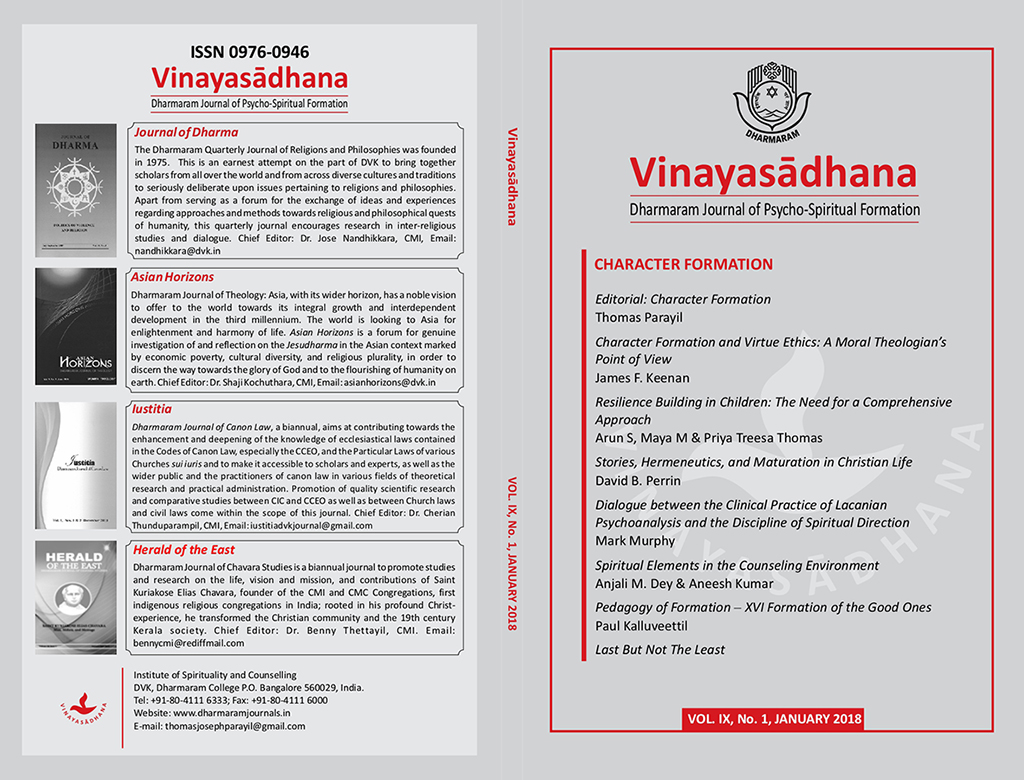Stories, Hermeneutics, and Maturation in Christian Life
Keywords:
Christian life, character formation, Hermeneutics, Maturation, conversionAbstract
In Christian life, many texts that have come down to us in the traditions act upon us in the same ways: they take us to the heart of the action. They transport us into their world so we can take part in what the text is all about. This is not to suggest that the Christian texts are fiction, as I described story-telling above. But, fiction or not, texts in general – and the dynamics that play out in the life of the individual and community when reading them – hold many things in common. Texts play a central role in the development of Christian life, conversion, and character formation since these texts bring us to absorb a world of values and actions that reflect the long-standing wisdom of the Christian traditions and our relationship with God. This article explains, from a textual hermeneutical perspective, why and how “reading” texts and stories of all kinds contribute to the personal spiritual-human development and, in turn, character formation in Christian life.
References
Martin, D. (1972). Art and the religious experience: The “Language” of the Sacred. Lewisburg: Bucknell University Press.
Miles, M. R. (1985). A hermeneutics of visual images, images and texts, and images and the life of the body. In Image as Insight: Visual Understanding in Western Christianity and Secular Culture (pp. 27-39). Boston: Beacon Press.
Perrin, D. (2000). The Mythopoetic interpretation of texts: Hermeneutical considerations. In J. Doyle (Ed.), Mythopoetic Perspectives of Men’s Healing Work: An Anthology for Therapists and Other (pp. 59-74). Westport, CT: Greenwood Press.
Perrin, D. (2007). Studying Christian Spirituality, London, UK: Routledge.
Perrin, D. (2013). Hermeneutical methodology in Christian Spirituality. THEOFORUM, 44, 317-337.
Ricoeur, P. (1965). History and truth, trans. and Introduction by C. A. Kelbley. Evanston, Illinois: Northwestern University Press.
Ricoeur, P. (1973). The Task of Hermeneutics. Philosophy Today, 17, 112-128.
Ricoeur, P. (1977). The Rule of Metaphor: Multi-disciplinary studies of the creation of meaning in language, R. Czerny (trans.) with C. McLaughlin, & J. Costello. Toronto: University of Toronto Press.
Ricoeur, P. (1977). Toward a hermeneutic of the idea of revelation. Harvard Theological Review, 70(1-2), 1-37.
Ricoeur, P. (1979). The hermeneutics of testimony. Anglican Theological Review, 51(4), 435-461.
Ricoeur, P. (1981). Hermeneutics and the human sciences. J. B. Thompson (ed., trans. and Introduction). Cambridge: Cambridge University Press.
Ricoeur, P. (Ed.). (1991). A Ricoeur reader: Reflection and imagination (Theory/Culture). Toronto: University of Toronto Press.
Ricoeur, P. (1991). From text to action: Essays in hermeneutics II. K. Blamey, & J. B. Thompson (trans.). Evanston: Northwestern University Press. Includes: “On Interpretation,” 1-20; “Philosophical Hermeneutics and Biblical Hermeneutics,” 89-101; “What is a Text? Explanation and Understanding,” 105-124; “Explanation and Understanding,” 125-143; “The Model of the Text: Meaningful Action Considered as a Text,” 144-167.
Schneiders, S.(1991). The problem and project of New Testament interpretation. In S. M. Schneiders, The Revelatory Text: Interpreting the New Testament as Sacred Scripture (pp. 11-26). New York: Harper San Francisco.
Sheldrake, P. (1992). Interpreting spiritual texts. In P. Sheldrake, Spirituality and History: Questions of Interpretation and Method (pp. 163-187) New York: Crossroad.
Tracey, D. (1981). The classic. In D. Tracey, The Analogical Imagination: Christian Theology and the Culture of Pluralism (pp. 99-124). New York: Crossroad.
Wyschogrod, E. (1990). Saints and Postmodernism: Revisioning Moral Philosophy (1990) Chicago: University of Chicago Press, 3-30.


